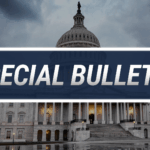Payers and providers square off to ensure patients aren’t stuck with huge costs.
EDITOR’S NOTE: Matthew Albright, chief legislative affairs officer for Zelis and the former Director of the Administrative Simplification Group of the Centers for Medicare & Medicaid Services (CMS), granted me an interview recently. What follows are excerpts from our conversation.
Buck: Recently, during a hearing of the House of Representatives Ways and Means Committee’s health subcommittee, healthcare stakeholders squabbled and pointed fingers at one another when discussing a proposed federal ban on surprise balance billing. Payers and providers agreed that the practice should be banned and that patients shouldn’t be caught in the middle. What is happening here?
Albright: Fortunately, at least for the time being, there is more agreement on the surprise balance billing issue than there is disagreement, and that agreement is across political parties and industry sectors. Like you said, everybody is in agreement that the patient should not be tagged with bills for healthcare services that (they) did not or could not agree to receive.
As for the differences: Have you ever had a discussion with a family member about who was responsible for completing a minor task – say, washing the dishes – and then, an hour later, you realize the conversation has turned into a complete reexamination of your entire relationship?
Similarly, surprise balance billing, in itself, is like washing the dishes: It’s rather obvious that it is a problem, and it’s not a terribly difficult issue to solve, but the fact that surprise balance bills occur at all is the result of deeper, broader issues within our healthcare system that we, as an industry and as a country, have not solved yet.
So when you watch the hearings on surprise balance billing and you read position letters from the various industry organizations and companies, you’re seeing that a talk about a relatively obvious and easy-to-address problem has unearthed deep-seated issues between healthcare sectors, especially between providers and payers.
As a country, we need to continue to work through the more difficult issues facing our healthcare system. However, in the meantime, hopefully, the various factions come to realize that fixing surprise balance billing is a lot like doing the dishes: it can be done quickly and easily without having to solve all the more difficult issues that lie behind it.
Buck: There are a number of proposed bills on this issue, including some with bipartisan support. And Sen. Lamar Alexander has also released legislation on surprise billing. Could you describe the various approaches in these bills, pointing out their differences?
Albright: There are at least five bills or proposals being considered, two in the Senate and three in the House. All of the bills prohibit patients from (receiving) surprise balance billing in cases of out-of-network emergency and unanticipated nonemergency care by an out-of-network provider. In short, most everyone agrees that the patient should be left out of the picture in these scenarios.
Once you get the patient out of the picture, the stumbling block is how much the provider should get reimbursed by payers for these out-of-network services.
The current bills propose different policy approaches, but if you look at the draft of the Low Health Care Costs Act recently introduced by Sen. Alexander, you’ll see surprise balance billing provisions that list out the various options being considered by the other bills:
- Option 1 requires a hospital to bundle the bills from a patient’s hospital stay and charge the in-network rate. This is the option that the White House has pushed for.
- Option 2 requires that the payor and provider come to an agreement on bills over a certain dollar amount, and if they disagree, they can initiate arbitration.
- Option 3 has the government setting a specific reimbursement rate. It requires the payor to pay the in-network rate for surprise balance bills.
Unfortunately, there is so much disagreement in the industry between these three options, the argument over a specific reimbursement approach may be the roadblock that stops this train.
Buck: We know that many states already have surprise balance billing protections. How will any congressional action affect those existing surprise balance billing state laws?
Albright: With only one exception – a House bill that is silent on the issue – the surprise balance billing legislation being considered in the both (the House) and the Senate allow states to keep the surprise balance billing protections that they have. Further, the implication seems to be that a state can adopt protections that take precedence even after a national law is passed.
This is good because there are now 25 states with some surprise balance billing protections, and three of those states – Nevada, Virginia, and Washington – passed laws just this year, while Congress was still mulling the issue over.
The problem with the state laws is that, in general, they don’t cover members of ERISA self-insured plans, and more than half of the insured in the United States are covered by their employer’s self-insured plan. It may get a little complex if some people are covered by their state law while others in the same state are covered by federal law. We’ll have to wait and see how they coordinate the state and federal laws.
Buck: With the 2020 presidential campaigns underway, Medicare for All is a hotly debated topic. A number of national polls show that Americans generally support a single-payer system. How are the discussions about a single-payor system affecting current policy approaches?
Albright: Even if the Democrats sweep both houses and the presidency in 2020, most analysts agree that we’re unlikely to see Medicare for All anytime soon. What is interesting, however, is how serious proposals for Medicare for All might affect current policy approaches. For one, the threat of single-payor may push the industry and the government to work proactively to fix some of the issues that plague our current system.
That’s why the surprise balance billing legislation is interesting to watch. Supporters of a single government payor point to these egregious surprise bills as an indication that our healthcare system was broken beyond repair. But as we’ve seen, Congress has seemed to rally around the idea and may get something published before the 2020 election.
I think it will be interesting whether other, broader, healthcare legislation – for instance, Sen. Alexander’s Lower Health Care Costs Act – will get this same kumbaya treatment.
Buck: You earned a Master of Divinity from Harvard University and also taught ethics and philosophy. What is the connection, if any, between your education and policymaking?
Albright: From early on, philosophers and theologians have pondered and tried to define “The Good,” as it is applied to us as individuals and to society. Every philosophy and religious group (and every parent!) has likewise tried to outline “The Good” in principles, and then create rules from those principles that could guide people to act (accordingly).
The founders of this country thought about this as well, and you see our principles of “The Good” outlined in documents like the Declaration of Independence and the Bill of Rights. To generalize, our founders concluded that a good society was one that allows the individual exercise of free will, but not so much that our individual freedom injures others.
The struggle – for religious groups, governments, and families – is when and how to craft rules that guide individuals and society toward The Good. I think the challenge in crafting rules is especially difficult in the United States because the country was founded on the idea that, left to their own devices, individuals would choose the good without too many rules.
In my education and early career, I enjoyed learning and teaching about how through human history, various thinkers and religious groups defined The Good and created rules from their definitions. For a while, I wrote rules at the state and federal level. Now, I’ve come full circle: Today I watch and study how state and federal governments actively work to guide society and its individuals toward The Good in real time. I continue to be fascinated and humbled by this process.
Comment on this article






















